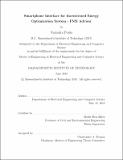| dc.contributor.advisor | Moshe Ben-Akiva. | en_US |
| dc.contributor.author | Peaks, Narindra | en_US |
| dc.contributor.other | Massachusetts Institute of Technology. Department of Electrical Engineering and Computer Science. | en_US |
| dc.date.accessioned | 2018-12-18T19:47:21Z | |
| dc.date.available | 2018-12-18T19:47:21Z | |
| dc.date.copyright | 2018 | en_US |
| dc.date.issued | 2018 | en_US |
| dc.identifier.uri | http://hdl.handle.net/1721.1/119724 | |
| dc.description | Thesis: M. Eng., Massachusetts Institute of Technology, Department of Electrical Engineering and Computer Science, 2018. | en_US |
| dc.description | This electronic version was submitted by the student author. The certified thesis is available in the Institute Archives and Special Collections. | en_US |
| dc.description | Cataloged from student-submitted PDF version of thesis. | en_US |
| dc.description | Includes bibliographical references (pages 77-78). | en_US |
| dc.description.abstract | The TRIPOD project aims to provide a system that optimizes energy savings during travel for a population of users, through personalized incentivization of efficient travel alternatives. The Future Mobility Sensing (FMS) Advisor provides the user interface for this system, allowing users to plan trips through a personalized menu of travel alternatives, receive rewards for selecting energy efficient options, and redeem those rewards for goods and services from partnered organizations. Packaged into a smartphone application, the Advisor provides an efficient user interface that allows users to plan trips, navigate those trips, view previously completed trips, and redeem rewards in the marketplace. However, it also requires a method to optimize usage of the sensors present in most smartphones to gather enough meaningful data on the users' travels in order to effectively personalize the trip planning process, as well as leverage that data to detect and validate the users' specified trips within the application so that rewards can properly be awarded. The validation algorithms are housed on a backend server that stores all the data for the system using a blockchain implementation in order to keep a record of transactions for all the trips and the marketplace. The FMS Advisor attempts to bring all four of these metrics, personalization, detection, validation, and incentivization, together into one mobile application framework, in a way that has not been done by any other applications currently on market. | en_US |
| dc.description.statementofresponsibility | by Narindra Peaks. | en_US |
| dc.format.extent | 78 pages | en_US |
| dc.language.iso | eng | en_US |
| dc.publisher | Massachusetts Institute of Technology | en_US |
| dc.rights | MIT theses are protected by copyright. They may be viewed, downloaded, or printed from this source but further reproduction or distribution in any format is prohibited without written permission. | en_US |
| dc.rights.uri | http://dspace.mit.edu/handle/1721.1/7582 | en_US |
| dc.subject | Electrical Engineering and Computer Science. | en_US |
| dc.title | Smartphone interface for incentivized energy optimization system : FMS Advisor | en_US |
| dc.title.alternative | Future Mobility Sensing Advisor | en_US |
| dc.type | Thesis | en_US |
| dc.description.degree | M. Eng. | en_US |
| dc.contributor.department | Massachusetts Institute of Technology. Department of Electrical Engineering and Computer Science | |
| dc.identifier.oclc | 1078639357 | en_US |
